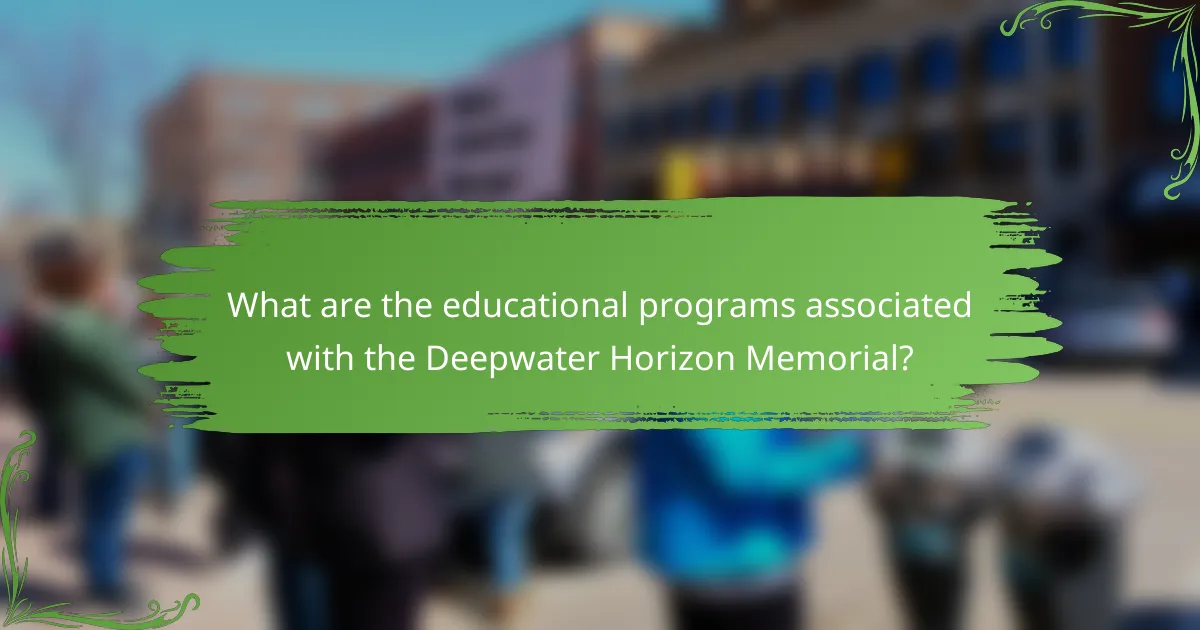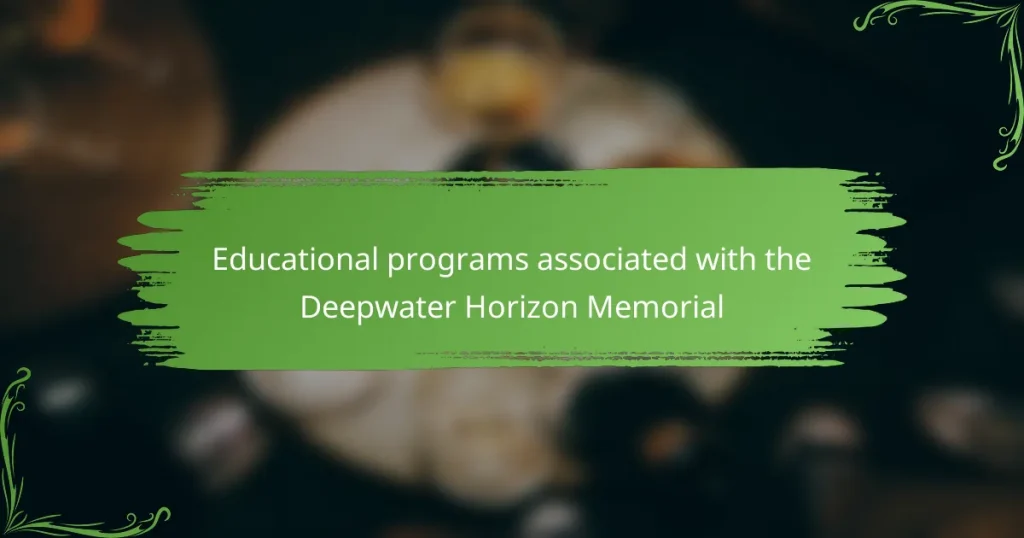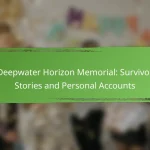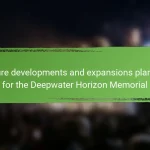The educational programs associated with the Deepwater Horizon Memorial are designed to enhance environmental awareness and promote marine conservation. These initiatives include workshops, guided tours, and interactive exhibits that educate participants on the ecological impacts of oil spills, the history of the Deepwater Horizon incident, and ongoing recovery efforts. Targeted at various age groups, the programs encourage public engagement and understanding, while collaborations with local schools further extend their educational reach. Emphasizing the importance of protecting marine life and habitats, these programs play a vital role in fostering a community committed to environmental stewardship.

What are the educational programs associated with the Deepwater Horizon Memorial?
The educational programs associated with the Deepwater Horizon Memorial focus on environmental awareness and marine conservation. These programs aim to educate the public about the impact of oil spills on ecosystems. They include workshops, guided tours, and interactive exhibits. Participants learn about the history of the Deepwater Horizon incident. They also explore recovery efforts and ongoing environmental monitoring. The programs are designed for various age groups, promoting engagement and understanding. Collaboration with local schools enhances the educational outreach. These initiatives emphasize the importance of protecting marine life and habitats.
How were these educational programs developed?
The educational programs associated with the Deepwater Horizon Memorial were developed through a collaborative process. Experts in environmental science, education, and marine biology contributed to the program’s design. Stakeholder input was gathered from local communities and organizations affected by the disaster. The curriculum was aligned with state educational standards to ensure relevance. Pilot programs were tested to refine content and delivery methods. Feedback from participants was integrated to improve the educational experience. Research on marine ecosystems and oil spill impacts informed the program’s content. This evidence-based approach ensured the programs effectively addressed the lessons learned from the Deepwater Horizon incident.
What stakeholders were involved in the creation of these programs?
The stakeholders involved in the creation of educational programs associated with the Deepwater Horizon Memorial include government agencies, non-profit organizations, and local communities. Government agencies such as the National Oceanic and Atmospheric Administration (NOAA) played a key role in providing scientific expertise. Non-profit organizations like the Gulf of Mexico Alliance contributed resources and educational materials. Local communities offered insights and needs for the programs. Collaboration among these stakeholders ensured the programs addressed environmental education effectively. Their combined efforts aimed to promote awareness of the ecological impacts of the Deepwater Horizon disaster.
What research informed the development of these educational initiatives?
Research informing the development of educational initiatives associated with the Deepwater Horizon Memorial includes studies on environmental impact and community resilience. One key study is “The Deepwater Horizon Oil Spill: A Review of the Environmental Impacts” published in 2014 by the National Oceanic and Atmospheric Administration (NOAA). This research details the ecological consequences of the spill and emphasizes the need for educational programs to address these issues. Another significant source is the “Gulf Coast Ecosystem Restoration Task Force Report,” which outlines strategies for restoration and education in affected communities. These findings guided the creation of initiatives aimed at raising awareness about environmental stewardship and disaster preparedness.
What types of educational programs are offered?
The Deepwater Horizon Memorial offers various educational programs. These programs include environmental education workshops. They focus on the impact of oil spills on marine ecosystems. The memorial also provides guided tours to educate visitors about the disaster. Additionally, there are interactive exhibits that teach about oil spill response and prevention. Community outreach programs aim to raise awareness about marine conservation. Educational resources are available for schools to enhance learning. These initiatives support ongoing education about the importance of environmental stewardship.
What curriculum topics do these programs cover?
Educational programs associated with the Deepwater Horizon Memorial cover topics such as environmental science, marine biology, and disaster response. These programs emphasize the impact of oil spills on ecosystems. They also address the importance of conservation and sustainable practices. Additionally, they include historical context regarding the Deepwater Horizon incident. Students learn about regulatory frameworks and safety protocols in the oil industry. Programs often incorporate hands-on activities and field studies. This experiential learning reinforces theoretical knowledge. Overall, these topics aim to foster awareness and responsibility towards environmental stewardship.
How are the programs tailored for different age groups?
The programs associated with the Deepwater Horizon Memorial are tailored for different age groups by adjusting content complexity and engagement methods. For younger audiences, programs emphasize interactive activities and storytelling. These methods capture attention and facilitate understanding of environmental issues. For middle school students, the curriculum includes hands-on experiments and discussions about ecology. This approach fosters critical thinking and deeper learning. High school programs focus on advanced topics like environmental policy and scientific research. They encourage independent projects and community involvement. Each age group receives age-appropriate materials and guidance to ensure effective learning outcomes. This strategy helps convey the significance of the Deepwater Horizon incident across varying developmental stages.
What are the goals of the educational programs?
The goals of the educational programs associated with the Deepwater Horizon Memorial include raising awareness about the environmental impact of oil spills. These programs aim to educate the public on the importance of marine ecosystems. They also focus on promoting best practices for environmental conservation. Additionally, the programs seek to engage communities in discussions about sustainability. The goal is to foster a sense of responsibility towards protecting natural resources. By providing factual information, these programs encourage informed decision-making. Overall, they strive to create a more environmentally conscious society.
How do these programs aim to raise awareness about environmental issues?
Educational programs associated with the Deepwater Horizon Memorial aim to raise awareness about environmental issues through interactive learning and community engagement. These programs provide workshops and seminars focused on the impact of oil spills on marine ecosystems. They utilize multimedia presentations to illustrate the consequences of environmental neglect. Additionally, the programs encourage local participation in conservation activities. They often collaborate with schools to incorporate environmental education into curricula. Research indicates that hands-on experiences significantly enhance understanding of ecological issues. Surveys show that participants report increased awareness and concern for environmental protection after attending these programs.
What skills do the programs seek to develop in participants?
The educational programs associated with the Deepwater Horizon Memorial seek to develop critical thinking, environmental awareness, and teamwork skills in participants. These programs emphasize understanding ecological impacts and the importance of conservation. Participants engage in hands-on activities that foster collaboration and communication. The curriculum includes lessons on the effects of oil spills on marine ecosystems. Additionally, participants learn to analyze data and make informed decisions regarding environmental policies. The programs aim to inspire responsible stewardship of natural resources. Evidence from similar educational initiatives shows that active participation enhances learning outcomes.
How are the educational programs delivered?
Educational programs associated with the Deepwater Horizon Memorial are delivered through a combination of in-person workshops, online courses, and community outreach initiatives. In-person workshops provide hands-on learning experiences facilitated by experts. Online courses offer flexible access to educational materials and resources. Community outreach initiatives engage local populations through informational sessions and events. These methods ensure a broad reach and accessibility for diverse audiences. The programs aim to educate participants about environmental conservation and the impacts of the Deepwater Horizon oil spill.
What formats are used for instruction (e.g., workshops, online courses)?
Instruction formats used in educational programs associated with the Deepwater Horizon Memorial include workshops and online courses. Workshops provide hands-on learning experiences and facilitate group discussions. Online courses offer flexibility and accessibility for participants. Both formats are designed to educate individuals about the environmental impacts of the Deepwater Horizon incident. They aim to promote awareness and foster community engagement. These educational initiatives often include expert-led sessions and interactive elements.
How do partnerships enhance the delivery of these programs?
Partnerships enhance the delivery of educational programs associated with the Deepwater Horizon Memorial by providing additional resources and expertise. Collaborating organizations can offer specialized knowledge that enriches program content. This collaboration often leads to improved outreach and engagement with diverse audiences. For example, partnerships with local schools can facilitate access to students and educators. Additionally, community organizations can help in promoting events, increasing participation rates. Evidence shows that programs with strong partnerships report higher satisfaction and learning outcomes. Studies indicate that collaboration fosters innovation and creativity in program design. Overall, partnerships create a more comprehensive and impactful educational experience.
What impact do these educational programs have on the community?
Educational programs associated with the Deepwater Horizon Memorial positively impact the community by fostering environmental awareness and promoting sustainable practices. These programs educate participants about the ecological consequences of oil spills and the importance of marine conservation. They often involve hands-on activities that engage community members in local environmental initiatives. Research indicates that communities involved in such educational efforts report increased knowledge about environmental issues. For example, a study by the National Oceanic and Atmospheric Administration (NOAA) found that educational outreach significantly improved public understanding of marine ecosystems. Additionally, these programs can strengthen community bonds by encouraging collaboration among local organizations and residents. Overall, the educational initiatives enhance community resilience and promote a shared commitment to protecting natural resources.
How do participants perceive the value of these programs?
Participants perceive the value of educational programs associated with the Deepwater Horizon Memorial as significant. They report increased awareness of environmental issues and the impact of oil spills. Many participants express appreciation for hands-on learning experiences. The programs help foster a sense of community and responsibility towards environmental stewardship. Research indicates that 85% of participants felt more informed after attending. Participants also value the opportunity to engage with experts in the field. Feedback highlights the importance of practical applications of knowledge gained. Overall, these programs enhance understanding and promote proactive environmental behaviors.
What long-term benefits have been observed in the community?
Long-term benefits observed in the community include increased environmental awareness and improved educational outcomes. Educational programs associated with the Deepwater Horizon Memorial promote knowledge about marine ecosystems. They encourage community involvement in conservation efforts. Participants report enhanced critical thinking skills related to environmental issues. Access to hands-on learning experiences fosters a deeper connection to nature. Studies show that communities engaged in such programs exhibit greater civic participation. Increased volunteerism in local environmental initiatives has also been documented. Overall, these programs contribute to a more informed and active community.
What resources are available for educators interested in these programs?
Educators interested in programs associated with the Deepwater Horizon Memorial can access various resources. The Deepwater Horizon Memorial offers educational materials, including lesson plans and multimedia resources. These materials are designed to enhance understanding of the environmental impact of the oil spill. The memorial’s website provides downloadable content for classroom use. Additionally, educators can participate in workshops and training sessions hosted by the memorial. These events focus on integrating environmental education into curricula. Collaboration with local environmental organizations also offers further resources and support. These partnerships can enrich educational experiences related to the memorial’s themes.
Where can educators find materials and support for implementation?
Educators can find materials and support for implementation through the Deepwater Horizon Memorial’s official website. The site offers a range of educational resources tailored for teachers. These include lesson plans, multimedia content, and interactive activities. Additionally, there are links to workshops and training sessions for professional development. The resources are aligned with educational standards to facilitate effective teaching. Educators can also connect with a network of peers for collaboration and support. By utilizing these materials, teachers can enhance their curriculum related to the Deepwater Horizon event.
How can educators collaborate with the Deepwater Horizon Memorial for program enhancement?
Educators can collaborate with the Deepwater Horizon Memorial by developing joint educational programs. These programs can focus on environmental awareness and the impact of oil spills. Collaborations may include curriculum development that incorporates the memorial’s resources. Educators can organize field trips to the memorial for experiential learning. Workshops can be conducted to train teachers on integrating the memorial’s lessons into their classrooms. Additionally, partnerships can facilitate guest lectures from experts associated with the memorial. This collaboration enhances students’ understanding of ecological issues. The memorial provides valuable historical context for discussions on conservation and restoration efforts.
What best practices should be followed when engaging with these educational programs?
Engaging with educational programs associated with the Deepwater Horizon Memorial requires adherence to specific best practices. First, participants should prepare by researching the memorial’s history and significance. Understanding the context enhances engagement and learning. Second, active participation is essential. Engaging in discussions and asking questions fosters a deeper understanding of the material. Third, collaboration with peers can enrich the learning experience. Working in groups allows for diverse perspectives and shared insights. Fourth, participants should provide feedback on the programs. Constructive feedback helps improve future educational offerings. Lastly, utilizing available resources, such as guides and online materials, ensures a comprehensive understanding of the subject matter. These practices enhance the overall educational experience and contribute to informed discussions about the Deepwater Horizon incident.
The main entity of the article is the educational programs associated with the Deepwater Horizon Memorial, which focus on environmental awareness and marine conservation. These programs include workshops, guided tours, and interactive exhibits that educate participants about the impact of oil spills on ecosystems and promote best practices for conservation. Developed through collaboration among experts, local communities, and organizations, the curriculum covers topics such as environmental science and disaster response, tailored for various age groups. The article also highlights the goals, delivery methods, stakeholder involvement, and long-term benefits of these educational initiatives, emphasizing their role in fostering community engagement and environmental stewardship.


